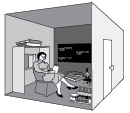
Imagine a future time when the physical sciences—including neurophysiology—are complete. A scientist named Mary learns every physical fact is the know, but without ever in her life having left a black-and-white room. One day she finally leaves and sees a red tomato. At that point she learns something new despite the fact that she already knew every neurophysiological fact about colour experiences.
This shows that complete knowledge of the physical universe still leaves out facts of subjective experience.
So physicalism—which implies that complete knowledge of the physical universe won't leave anything out—must be false.
Frank Jackson (1986).